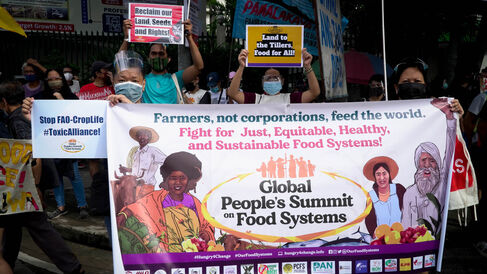
Sovereignty and the Food Systems Summit by Hitesh Pant
The fourth instalment in our project blog, where From Collection to Cultivation members share research insights, snippets, and ideas.
On 23 September 2021, the United Nations Food Systems Summit was inaugurated during the UN General Assembly as a significant historical event for the future of the global food system. The COVID-19 pandemic seemed to reaffirm the importance of a multilateral forum as a platform to construct an egalitarian food system, all at a time when empty supermarkets, rotting produce, lack of temporary agricultural workers, and the forced cull of domestic animals laid bare the disproportionate impact of the ‘hunger pandemic’ on society’s most vulnerable populations.
More than 150 attendees, including world leaders, philanthropists, farmers, and business representatives attended the Summit in New York. Donors pledged $11 billion for new local and global initiatives, from supporting indigenous food systems, re-thinking agricultural subsidies, precision agriculture informed by accurate data collection, to state support to test genetically engineered foods capable of withstanding extreme weather conditions. And yet, it was the highly advertised public boycott of the Summit supported by more than 300 civil society organisations, peasant and indigenous activists, and scientific organisations that dominated the headlines throughout the months leading up to the event. If the Summit was being projected as a people’s platform for a sustainable future, then why did those who were categorised as the main beneficiaries of the initiatives choose to shun the event entirely?
My PhD research looks to trace the history of seed sovereignty, which encapsulates the campaign of peasants, landworkers, indigenous groups, and activists to protect seeds as collective heritage. Seed sovereignty builds on the lineage of social movements opposed to the incursion of genetically modified organisms, intellectual property rights regimes, and agri-industrial corporations over local food systems. Supporters of seed sovereignty fight for the right to save, replant, share, and breed new varieties of seeds, while also pushing to ensure that they can actively participate in policies towards a rights-based food system.
As I moved into the recent past to understand the critical moments that spurred small farmers and growers to collectively raise their voices through the seed sovereignty movement, it became increasingly apparent to me that the ideas and issues that have haunted rural communities since the mid-twentieth century have yet to be reconciled. As activists showed their dissatisfaction over the administration of the Food Systems Summit, I realised that their opposition was deeply entangled with themes that ran across the modern history of seed sovereignty.
During research, I uncovered that this contest over agricultural knowledge, its application, and the people best placed to study our food systems was also at the heart of the debates over rural development during the world food crisis of the early 1970s. At the time, international development institutions believed that a technologically-oriented solution that combined the green revolution’s high yielding variety of seeds, intensive application of chemical fertilisers, and extensive agricultural credits would solve the food crisis and feed a growing human population. However, small farmers who were forced to apply these measures witnessed negative effects, with the new seed varieties unable to adapt to local environmental conditions such as extreme droughts and floods. Also, these new seeds relied on the heavy use of chemical fertilisers, which trapped farmers into a trade regime that benefitted large agri-businesses. Since the new seeds were forced on farmers through national policies, they gradually began to replace the diverse seed varieties that farmers had selected over generations.
The Civil Society and Indigenous People’s Mechanism (CSM), which provided the platform for grass-roots food activists to feed their ideas into the UN Committee on World Food Security, was outraged at the exclusive nature of the scientific understanding of the food system that was being pedalled at the Summit. The CSM was critical of the Summit’s Scientific Group, because they believed that it advanced an extremely narrow, business-centred logic of food production that excluded other systems including agro-ecology, indigenous knowledge, and rights-based approaches to food. Nettie Wiebe, one of the first women coordinators of La Via Campesina, the International Peasants’ Movement, claimed that the Summit was ‘deeply undemocratic, unaccountable and dismissive of those without wealth and power’.
The CSM’s disapproval of the Summit directly hit on these issues, and activists argued that it failed to resolve these historical problems. Indigenous groups and peasant activists were particularly shocked when the UN Secretary General chose Agnes Kalibata, the former Rwandan minister for Agriculture, to lead the Summit. They believed that Kalibata, who is president of the Alliance for a Green Revolution in Africa, was unfit to hear the voices of the majority of the world’s agricultural producers because of the Alliance’s direct links to large agri-industrial conglomerates.Activists believed that the multi-stakeholder platform propped up by the Summit was deceitful, because its leader was already firmly aligned with a specific side. The Summit, in their eyes, was being designed by corporate representatives.
The struggle for the right to grow culturally and environmentally appropriate foods is at the heart of the seed sovereignty campaign. My research illuminates how this historic struggle has clear implications for the present and future of our food system.
You can find out more about Hitesh's research at his research page here.
